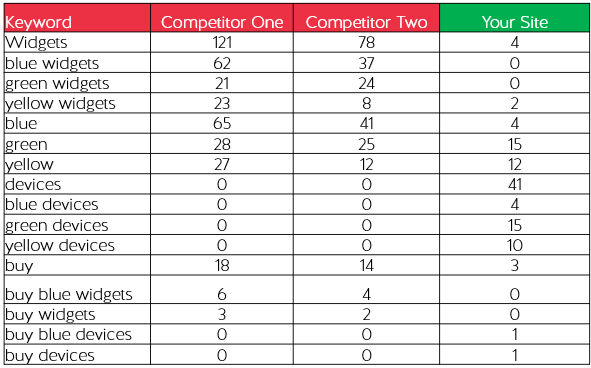Which keywords should get first priority in your SEO campaigns? Which will bring the quickest wins (and which will be the biggest challenges)?
In this episode of the award-winning Here’s Why digital marketing video series, Eric Enge explains how a Ranking Content Quality Analysis can help you answer those questions and shows you how to perform one.
Don’t miss a single episode of Here’s Why. Click the subscribe button below to be notified via email each time a new video is published.
Resources
Transcript
Mark: So Eric, what is a ranking content quality analysis or RQCA?
Eric: Boy, that’s a mouthful.
So, the basic concept is to actually see what Google thinks of your site by going through the process of pulling all the keywords that you currently rank for and doing an Ngram analysis around the words in those keywords. That sounds like a mouthful too! But you might actually end up seeing something like this.

Mark: Okay. So why is that helpful?
Eric: It tells you what types of queries you’re most likely to rank for based on the words that you see in these queries here, and you can use this to prioritize your SEO campaign efforts going forward.
So, let’s say you have a sports site, and you want to rank for some specific college basketball related terms. I’m just making the example up here. If you’re currently ranking for many pro basketball related terms but not many college ones, achieving your goals might actually be pretty challenging.
Mark: How do you do that analysis?
Eric: You take your Ngram analysis below, and you look through that to see what phrases you rank for, and actually each of the individual words in those phrases.

In this particular example we’re showing right now, the analysis shows a high volume of keywords ranking with the word “green” in them. I’m obviously not doing a college basketball example. But note the far smaller number of instances that contain the word “blue” in them.
This suggests that it will take far more effort to rank for new blue-related terms–just because Google hasn’t quite bought that for your site yet–than it will be to rank for new green-related terms. And if you’re looking for easy wins then this can actually tell you where you should focus.
Mark: So does that mean you don’t pursue those blue-related terms at all?
Eric: No, not necessarily. It might be strategic and very important for you to consider chasing those terms anyway. But the big insight from an RQCA analysis is a better appreciation for how much work it will take you to win on those terms.
Mark: Thanks, Eric.
Don’t miss a single episode of Here’s Why. Click the subscribe button below to be notified via email each time a new video is published.
See all of our Here’s Why Videos | Subscribe to our YouTube Channel


What are your recommendations on scalability for a large content site? As a content publisher, the keywords we rank highly for is in the tens of thousands.
Can you recommend one or more tools to run a proper Ngram analysis? Would using Google’s own keywords tool be an example?
great question. What I would do for is focus your attention on the top 1% of your keywords as that will provide the large amount of benefit. Doesn’t really answer the scaling question at one level, but it does give you an idea on how to get the most impact from limited efforts.
What tools do you use to pull the keywords? Google Search Console and Ahrefs (or SEMrush, etc)? Once you have the keyword list, how do you do the Ngram analysis? P.S. Love the “Here’s Why” videos – keep it up!
I should pay more attention to my keywords.
Currently I have had the unexpected issue, that if someone searches for me on Google with “blaze magician”, google considers “magician” to be the same word as “wizard”, so tons of blaze wizard matches from a video game come up first.
I should examine my keywords and see if I can find anyway around the issue.
I use a combination of this tool: http://guidetodatamining.com/ngramAnalyzer/ and Excel.
Hi Justin, I use http://guidetodatamining.com/ngramAnalyzer/ to help with the N-gram analysis, in combination with Excel to do some massaging of the data.
To pull the keywords, we use SEMRush, but other tools can be used to do that too. Anything that will get you detailed data on what keywords a page ranks for will work well here.